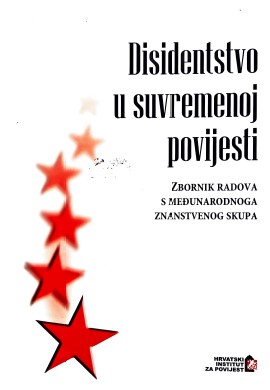Đilasovci u Hrvatskoj i hrvatska historiografija
Đilasovci’ in Croatia and Croatian Historiography
Author(s): Zdenko Radelić
Subject(s): Political history, Government/Political systems, Political behavior, Post-War period (1950 - 1989), History of Communism
Published by: Hrvatski institut za povijest
Keywords: Croatia; KPJ/SKJ; KPH/SKH; Communism; dissidence; the Djilas movement; Croatian historiography; Naprijed;
Summary/Abstract: The author reviewed works of Croatian Historiography which were concerned with the liberalization of the Communist Party of Yugoslavia (KPJ) in Croatia during the first half of the 1950s, the period characterized by the conflict with the Cominform, the introduction of self-management and the declarative transformation of the KPJ from an executive state party into a consultative party which would become a point of contact for various ideas with the aim of building a communist society. The liberalization of the League of Communists of Yugoslavia (SKJ) is tied to the name of Milovan Djilas who in the League daily Borba with suggestions regarding the democratization of the land and the struggle against the bureaucratized state system and the monopolistic role of the SKJ went further than was imagined by the chief authority, the general secretary of the SKJ, Josip Broz Tito. In Croatia similar suggestions for public debate, the presentation of more candidates at elections, and open can-didatures despite, and against the demands of political bodies such as the SKJ and the SSRN, were expressed most prominently in the weekly Naprijed, while the ‘đilasovština’ (the Djilas movement) was, aside from the members of the editorial board of Naprijed such as Berto Črnja, Dušan Diminić, Toma Đurinović, Ljuba Grubor, Stjepan Šeparović, Petar Šuran, Hrvoje Šarinić, and Živko Vnuk, ascribed as well to Gušta Šrpljan, the director of the political school of the League of Communists of Croatia (SKH), Ljubo Drndić, the candidate from the municipal list in the electoral district of Poreč – Buzet, and Mile Joka, the candidate for the municipal list in Dvor. Following the removal of Djilas and the slowing down of the process of liberalization of the SKJ, all of these individuals were politically and socially marginalized, and only much later did some of them return to less influential positions in society. In this work the author consulted historiographical works of a scholarly type, encyclopaedia entries, and collections of documents along with the recollections of witnesses.
Book: Disidentstvo u suvremenoj povijesti
- Page Range: 53-74
- Page Count: 22
- Publication Year: 2010
- Language: Croatian
- Content File-PDF

